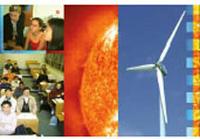|
|||||||||||||||||||||||||||||||||||||||||
| Renewable Energy Engineering - 3657 | |||||||||||||||||||||||||||||||||||||||||

This program commenced in 2003 and is a four year full-time program. Discussions on course content were held with Australian manufacturers, major end-users, the NSW Sustainable Energy Development Authority, the Australian CRC for Renewable Energy and the industry representative association, Solar Energy Industries Association of Australia.
Consultation also took place as necessary with other schools within UNSW. In particular, the plans for this program have been developed in collaboration with the School of Mechanical Engineering, the School of Electrical Engineering and Telecommunications and the Faculty of the Built Environment. All of these schools offer courses within the new program. Approximately half of the material for this program is in common with the program in Photovoltaics and Solar Energy. However, this program in Renewable Energy Engineering encompasses a wider range of renewable energy technologies and their use. These include heat and electricity generation from solar thermal systems, photovoltaics, wind turbines, biomass and the important areas of solar architecture and the design of energy efficient buildings and appliances. Note Renewable Energy Engineering is also available as a component of the dual degree programs
BE (RE Eng)/BSc program 3658 program 3658 BE (RE Eng)/BCom, program 3715 program 3715 BE (RE)/BA program 3704 program 3704 BE (RE)/LLB, program 4778 programs4778 For details of all academic requirements see Rules Program Objectives and Graduate Attributes Please see Rules
In order to fulfill the requirements of the degree students must complete 192 UOC, with 150 UOC of core courses, 30 UOC of professional electives and 12 UOC of General Education courses.
Year 1
Choose ONE of:
And ONE of:
And ONE of:
And ONE of:
Plus the following 2 courses:
Plus choose 2 electives from the Year 1 Elective List Electives
Suggested Year 1 electives for this program are:
Year 2
Year 3
Year 4
With the program authority's permission courses can also be chosen from amongst the electives offered by other Schools, provided that appropriate pre-requisites have been satisfied and they conform to the units of credit requirements.
Areas of Specialisation
General Education Requirements Please see Rules
Please see Rules
Please see Rules
For information regarding fees for UNSW programs, please refer to the following website: https://my.unsw.edu.au/student/fees/FeesMainPage.html
Industrial Experience Requirements Please see Rules
The BE in Renewable Energy is fully accredited by the Institution of Engineers, Australia.
Area(s) of Specialisation |
|||||||||||||||||||||||||||||||||||||||||


